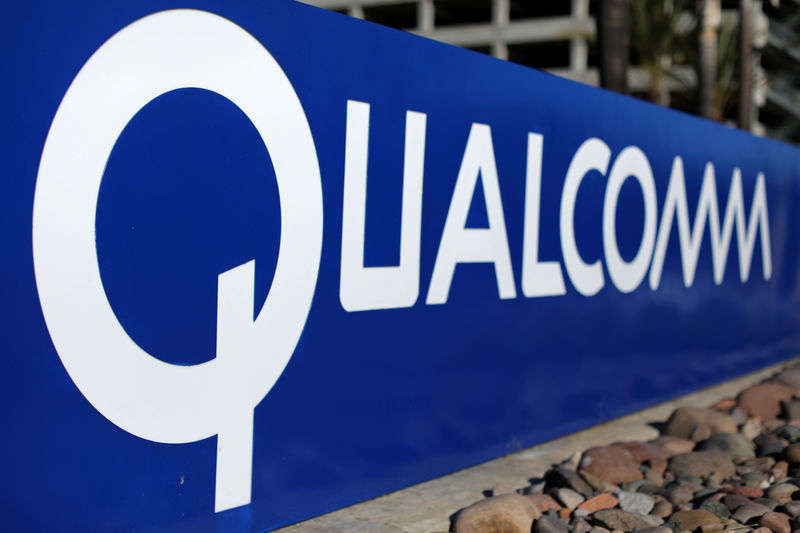By Liana B. Baker and Greg Roumeliotis
(Reuters) - U.S. chipmaker Qualcomm Inc (O:QCOM) said on Monday it was not looking to revive its abandoned $44 billion acquisition of Dutch peer NXP Semiconductors NV (O:NXPI), a day after the White House said China would reconsider clearing a deal if it was attempted again.
Qualcomm, the world's biggest smartphone-chip maker, walked away from its agreement to buy NXP in July, after failing to secure Chinese regulatory approval. The planned deal was first agreed between the two companies in October 2016.
Qualcomm, headquartered in San Diego, California, and NXP, based in Eindhoven, the Netherlands, needed China’s blessing for their deal because of their presence in that country.
After high-stakes talks on Saturday between U.S. President Donald Trump and Chinese President Xi Jinping in Argentina, the White House said in a statement that China was "open to approving the previously unapproved" deal for Qualcomm to acquire NXP "should it again be presented".
But Qualcomm said there was no prospect for the acquisition to be revived.
"While we were grateful to learn of President Trump and President Xi's comments about Qualcomm's previously proposed acquisition of NXP, the deadline for that transaction has expired, which terminated the contemplated deal," a Qualcomm representative said via email.
"Qualcomm considers the matter closed."
NXP declined to comment.
On Monday, White House economic adviser Larry Kudlow told reporters that President Trump put the issue of the acquisition on the table in the talks with the Chinese president.
Kudlow added that the Chinese president's openness to the deal was a sign of further cooperation on multiple issues, including corporate mergers. Xi's reported comment could embolden some potential acquirers in the semiconductor space to explore transactions, corporate dealmakers said.
"Although that acquisition cannot be resuscitated, Xi’s comment reveals in plain sight that Chinese antitrust policy is inherently politicized," said Scott Kennedy, a China expert at the Center for Strategic and International Studies in a blog post.
Qualcomm shares closed up 1.5 percent at $59.14 in New York on Monday, while NXP shares ended up 2.75 percent at $85.67.
Qualcomm and NXP did not lobby for the Trump administration to bring up the abandoned deal in its meeting with Xi and other Chinese officials on the sidelines of the G20 summit in Buenos Aires on Saturday, which was dominated by negotiations over trade tariffs, according to sources close to the companies.
The two companies were surprised to see that the terminated deal resurfaced as an issue, the sources added, requesting anonymity to discuss confidential deliberations. Qualcomm was given just an hour’s notice by the Trump administration about Xi's comment on the NXP deal, and its inclusion in the White House statement, according to two of the sources.
The Trump administration had unsuccessfully lobbied the Chinese government earlier this year to give its blessing to the deal.
China's foreign ministry declined to comment on Qualcomm during a regular media briefing on Monday.
Qualcomm had sought to purchase NXP because of its market position as a dominant supplier to the automotive market, as car makers add more chips to vehicles each year. Qualcomm is now focused on developing its own chips for the automotive market, according to one of the sources.
Qualcomm had to pay NXP a $2 billion fee to terminate the deal. To appease its shareholders, Qualcomm has also embarked on a $30 billion stock repurchase plan to return to them most of the money that would have been used for the NXP deal. It has spent more than $20 billion in share buybacks in the last 12 months. NXP has also announced its own $5 billion share buyback program.
DEALS ABANDONED
Several deals by semiconductor companies were put on ice after the Qualcomm/NXP deal fell through, simply because they had a footprint in China and required regulatory approval there. Now, chip companies may be more optimistic about their regulatory chances in China.
One example could be Xilinx Inc (O:XLNX), a U.S. provider of chips used in communications network gear and consumer electronics that has a big presence in China. Xilinx is currently vying to acquire Israeli chip maker Mellanox Technologies Ltd (O:MLNX) after it decided to run an auction to sell itself, according to people familiar with the matter. A successful acquisition of Mellanox could prove an important test of China's appetite to approve such deals. A representative for Xilinx declined to comment. Mellanox did not immediately respond to requests for comment.
A more near-term test being watched by dealmakers is KLA-Tencor Corp (O:KLAC) pending acquisition of fellow semiconductor equipment maker, Israel's Orbotech Ltd (O:ORBK). The $3.4 billion deal, announced in March, is still awaiting Chinese regulatory approval. KLA-Tencor's CEO said on the company's last earnings call that he expects the deal to close by year end.
Thus far, other high-profile mergers and acquisitions involving U.S. companies in other sectors have received Chinese approval. Last month, China approved United Technologies Corp's (N:UTX) $30 billion purchase of aircraft parts maker Rockwell Collins Inc (NYSE:COL) and Walt Disney Co's (N:DIS) $71.3 billion deal to buy most of Twenty-First Century Fox’s (O:FOXA) entertainment assets.

Acquisitions of U.S. companies by Chinese companies, on the other hand, have been few and far between in the last year, after the Committee on Foreign Investment in the United States (CFIUS), a government panel that scrutinizes deals for potential national security risks, shot down more of these deals, such as Ant Financial’s plan to acquire U.S. money transfer company MoneyGram International Inc (O:MGI). U.S. lawmakers also passed reforms earlier this year that increased CFIUS' scrutiny of deals.